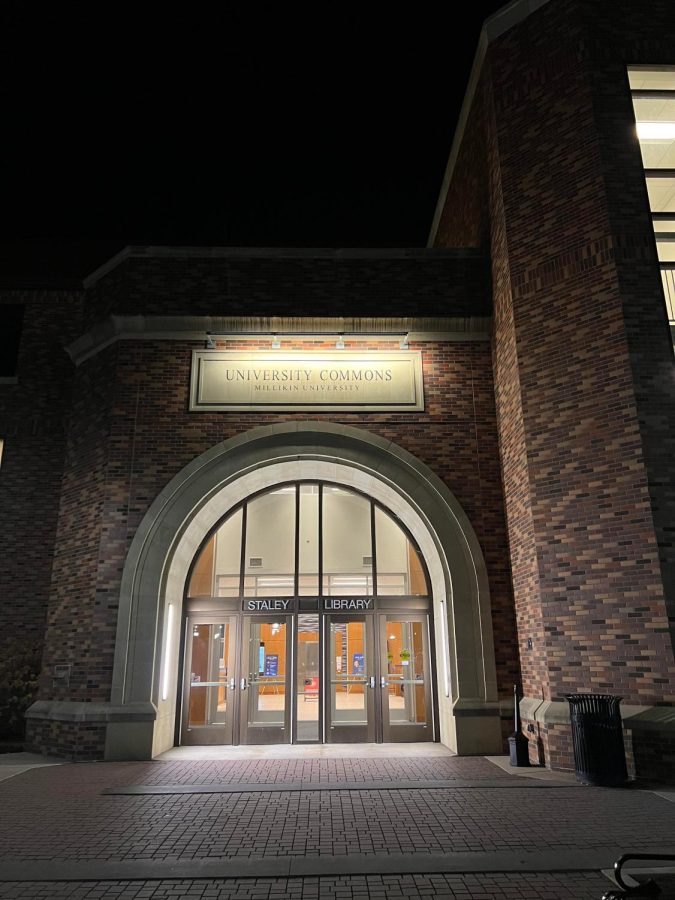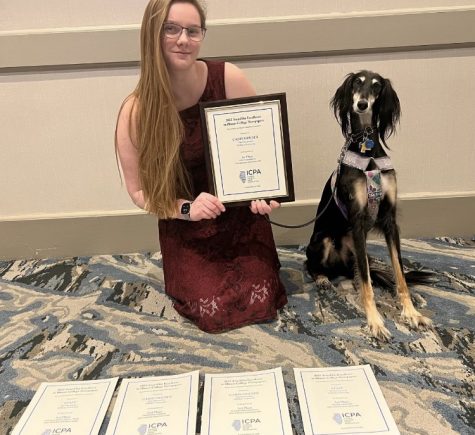The FDA claims that the average moderately active male college student (ages 18-25) needs 2,800 calories a day. However, many students on campus don’t have access to food, let alone that many.
A study done by scholars at Temple University explains how significant food-insecurity is on college campuses. “Overall, 23% of undergraduates, and 12% of graduate students, are experiencing food insecurity.”
The assumption at Millikin is that we have the same problem.
“Whatever the national data point is, we tend to embrace that as saying okay, we are probably dealing with the same challenges at our university,” Dr. Wallace Southerland, vice president for student affairs, said.
Experts on Millikin campus project similar statistics, though they do not know the exact extent of the issue.
“My best guess would be that there are a couple of hundred students who are experiencing moderate to severe food insecurity, and maybe 50 to 100 that are so bad that it affects their performance in class,” Campus Chaplin and advisor for the Big Blue Pantry, Marty Brilley said.
Assistant Vice President of Administrative Services, Stacey Hubbard, directly handles students’ FAFSA information each year.
“I don’t know that we [can] pull students [information] by below the poverty line,” Hubbard said.
Due to this limitation in data availability, it makes it difficult for administration to have a firm grasp on the issue on campus.
“We know how many students come to us with what you know if you file the FAFSA, you know that is zero EFC or a zero expected family contribution or this year it’s student aid index is zero which means they’re the highest need,” Hubbard said.
It is important to note that simply because a student projects zero expected family contribution to their academic expenses, it does not mean they are from below the poverty line or food insecure.
Students who are offered financial aid and grants can use this on meal plans in addition to room and board, and tuition. However, it depends on exactly what they are offered.
“The Federal Pell Grant is not restricted to just tuition only,” Hubbard said, “Our State of Illinois map grant is restricted to only cover tuition.”
Despite this though, students on campus continue to struggle.
Southerland encourages students to ask for help when they need it.
“Ask for help right away,” Southerland said.
Campus has resources available to students, but it is limited. Due to its limitations, students must acquire a referral from a faculty member before gaining access to any form of on-campus assistance.
Millikin is equipped with its own food pantry, meal tickets, and an emergency fund set up to assist students who are hungry.
“We use kind of a target system, and the bullseye are students who are experiencing food hunger, rather than insecurity and there’s, there’s a difference,” Brilley said, “hunger is when you’re hungry and you don’t know where you’re gonna get your next meal either tomorrow or a week later or a month later.”
Determining the level of a particular student’s immediate need can be difficult though.
“First, we rely a lot on the honesty and the integrity of the student giving us the information,” Southerland said.
After the initial conversation with the student, they may ask for verification depending on the needs of the student.
“If a student says I lost my scholarship, and I was using my scholarship to help pay for food, that we need to have verification that a student lost a scholarship,” Southerland said.
One of the biggest roadblocks for students is asking for help, and accepting help when it is offered.
“I encounter students all the time, who I reach out to help and they say, ‘Oh, Marty, I’ll be okay. I’m sure there’s someone who needs help more,’” Brilley said.
The stigma around food insecurity causes an unknown number of students on campus to suffer.
Multiple students declined to interview for this article, not because of their lack of need, but because of the unspoken social impacts it can have. This further limits administration’s ability to support students in need.
Due to this, resources on campus focus on confidentiality.
“We also have multiple departments that have what we call pop up closets, where they pay out of their own pocket,” Brilley said, “These professors and administrative assistants, they have gained the trust of students to protect confidentiality, which is something the pantry also does, which kind of inhibits us from going public with the pantry.”
Food insecurity on campus is not new. Alumni Alexsenia Ralat experienced food insecurity during her time at Millikin.
“When I was a freshman, I was able to go to the cafeteria, [RTUC],” Ralat said, “My freshman year of college was the first time in my life that I could have three meals a day, which was very exciting to me. It also meant that I gained a lot of healthy weight.”
Freshmen at Millikin are required to enroll in a meal plan, which is why Ralat had access to the cafeteria.
“After I lost access to the cafeteria, I was right back to square one,” Ralat said.
Ralat managed to sustain herself throughout the remainder of her time at Millikin on the bare minimum number of calories she could.
“Lots of ham and cheese sandwiches,” Ralat said, “A roommate taught me how to make burger bombs, which are a cheeseburger inside of a bun, and that would last me two weeks.”
When the laws in Illinois changed to allow college students to apply for EBT cards, Ralat did. However, it did not solve her issue.
“I had a bunch of friends who were lower class, so lower incomes,” Ralat said, “We tended to kind of share the wealth in that manner. Share food, things like that, to take care of each other.”
After college, Ralat’s experiences with food-insecurity continue to affect their shopping habits.
“I have an interesting relationship with buying food now,” Ralat said, “I feel like ‘oh my gosh, I can’t buy this thing that I like because it is $5’ it’s too much for that.”
Ralat intentionally stays away from name brands in an effort to avoid overspending on groceries.
Looking back to their time at Millikin, Ralat is happy to see that campus has opened a pantry but believes there is still more to be done.
“I would like to see the University do a free food night at the cafeteria,” Ralat said, “It doesn’t have to be every night, but take steps like that to help students who have been impacted by food insecurity.”
In the end, food insecurity continues to be a long-term issue on campus that affects students every day.


